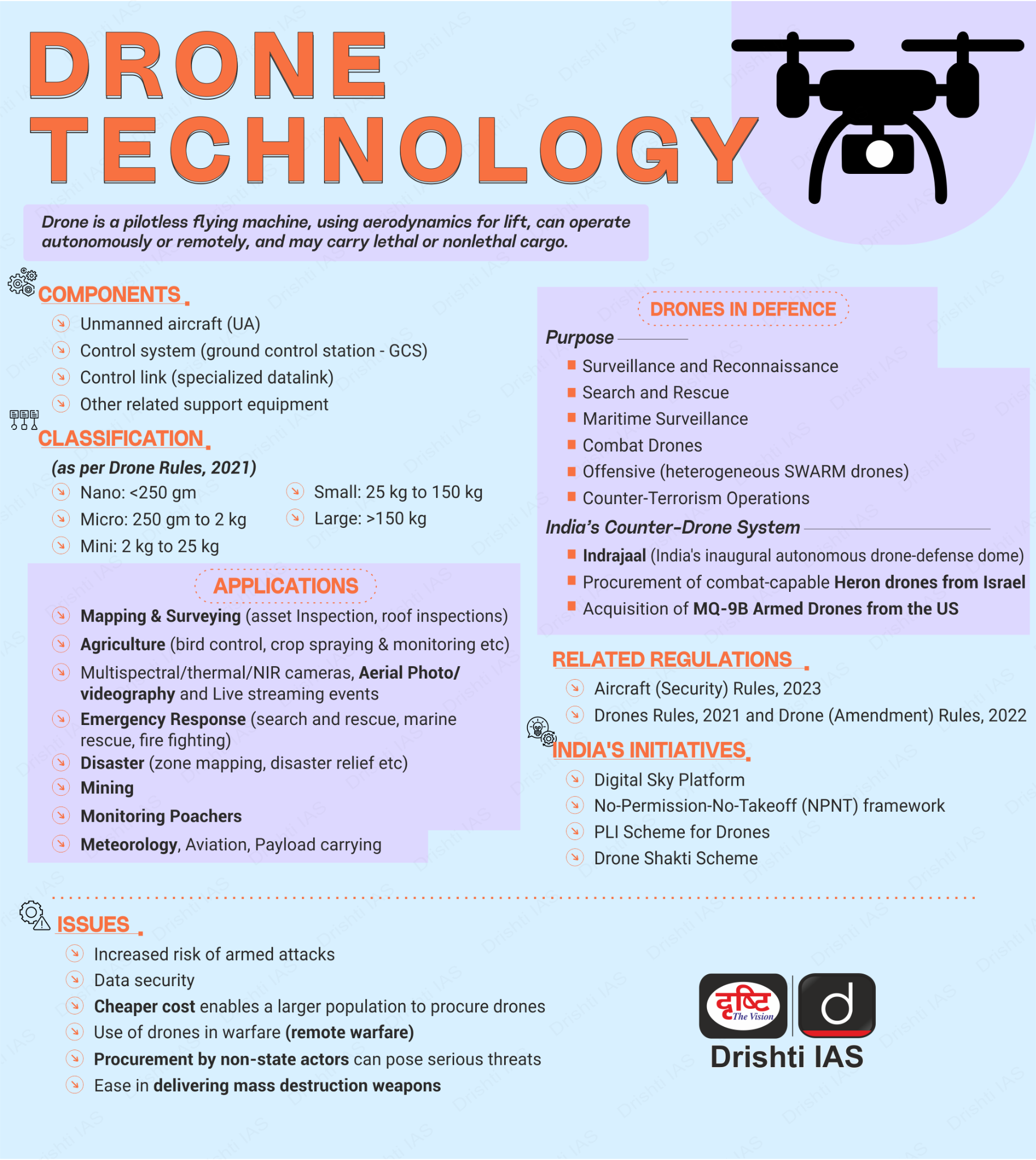Uttar Pradesh Switch to Hindi
Uttar Pradesh Drone Safety Policy
Why in News?
In the last four months, multiple First Information Reports (FIRs) have been filed and several people arrested in various districts across Uttar Pradesh for flying drones without permission or spreading rumours about "drone gangs."
Key Points
- Objective: The policy mandates strict monitoring and regulation of drone use at the district and commissionerate level to ensure safety and control over drone operations within Uttar Pradesh.
- Drone Monitoring and Registration Register: Each district is required to maintain a dedicated register for tracking the details of all registered drones, operators, and local repair centres.
- Drone Monitoring Committees:
- The District Magistrate (DM) will chair a district-level drone committee.
- The Senior Superintendent of Police (SSP) or Superintendent of Police (SP) and Additional District Magistrate (ADM) will be members of the committee.
- Responsibilities: The committee is tasked with overseeing drone operations, ensuring compliance, and addressing any unauthorised use.
- Red Zones for Restricted Airspace:
- Temporary Red Zones: The district-level committee has the authority to declare temporary red zones for restricted airspace when required.
- Duration: Red zones will be in effect for up to 96 hours and will be marked on the Digital Sky platform.
- Local Intelligence and Awareness Campaigns:
- Intelligence Network: Local intelligence networks and social media monitoring will be activated to counter rumours related to drones.
- Public Awareness: Awareness campaigns using UP-112 and digital platforms will be conducted to educate the public about legitimate drone activity.
- Rapid Police Response: Ensure a swift police response to any complaints or concerns regarding drone activity.
- Online Drone Registration Portal: The state government to establish an online portal to facilitate the registration of all drones operating within Uttar Pradesh.
- All drone operators must declare their details through this platform, and these details will be recorded at the local police station.
- Each police station must maintain a local register containing information on drone registration numbers, ownership details, and details of local mechanics.
- Penalties: Unauthorised drone operations will lead to severe penalties, as per the Drone Rules, 2021 and applicable criminal laws.
- Coordination: In case of any suspected aerial threats, the police must immediately inform the Air Force Operations Room and the Directorate of Civil Aviation.
- Survey Notification: No drone survey can be conducted without prior intimation to the local police station.
Rajasthan Switch to Hindi
Rajasthan Notifies New Land Law
Why in News?
The Rajasthan State Government has enacted the Rajasthan Land Revenue (Amendment and Validation) Act, 2025, to expand the powers of the Rajasthan State Industrial Development and Investment Corporation (RIICO) in managing and regulating land in industrial areas.
Key Provisions of the Act
- About: The Act, which received the Governor's assent on 3rd October 2025, amends the Rajasthan Land Revenue Act of 1956.
- It aims to streamline land administration, validate past transactions, and accelerate industrial development throughout the state.
- Background: The Act addresses issues arising from the April 2023 ruling by the Supreme Court in the case of the state government versus Arafat Petrochemicals.
- The ruling stripped RIICO of its powers over the 37 industrial areas transferred before 1979, leaving industrial units in these zones uncertain about land management and development.
- In response to these challenges, the state revenue department introduced the bill in the state assembly during the 2025 Budget session. After addressing concerns raised by lawmakers, the bill was referred to a select committee and was cleared for enactment.
- Increased Powers for RIICO: The Act grants RIICO full authority over land management, planning, development, conversion, and disposal within industrial zones.
- It recognises RIICO as the principal agency for industrial area development, providing legal backing to its actions, which it has been carrying out for decades.
- Validation of Past Transactions: The Act validates all past land-related decisions made by RIICO, including Land transfers, sub-divisions, mergers of plots, changes in land use and Regularisation activities in industrial areas under RIICO’s control.
- Even actions involving procedural errors or a lack of formal approvals will now be considered valid under state law.
- The provision overrides contrary court judgments or technical defects, thereby resolving long-standing legal ambiguities.
- Exemption: The Act explicitly excludes industrial land leases that were cancelled before September 18, 1979, from its provisions.
- Relief for Industrial Sectors: The Act provides significant relief to industries, particularly in sectors such as IT, warehousing, and hotels.
- It aims to boost investor confidence by offering greater legal certainty and predictability in land management.
Uttar Pradesh Switch to Hindi
PM2.5 Levels in the Indo-Gangetic Plain (IGP)
Why in News?
A recent report by the Centre for Research on Energy and Clean Air (CREA), based on data from the Central Pollution Control Board, ranks Varanasi as the cleanest and Kolkata as the third cleanest city among 17 cities in the Indo-Gangetic Plain (IGP) in terms of PM2.5 concentration.
Key Points
- Ranking of Cities by PM2.5 Levels:
- Varanasi: Tops the list with the lowest PM2.5 concentration among the cities in the IGP.
- Siliguri and Prayagraj: These cities tie for second place in terms of PM2.5 levels.
- Kolkata: Ranked third in the IGP, indicating relatively cleaner air compared to many other cities.
- Ghaziabad: Worst-polluted city in the IGP with significantly higher pollution levels.
- Geographic and Meteorological Factors: The IGP is a globally significant air pollution hotspot, attributed to a combination of dense population, intense human activity, and unfavourable weather patterns.
- The region experiences dangerously high concentrations of PM2.5 and other pollutants, severely affecting public health and life expectancy.
- Kolkata, situated at the eastern extremity of the IGP, experiences trans-boundary air pollution that typically moves from northwest to southeast along the Gangetic valley, contributing significantly to the city's pollution load.
- National and Regional Air Quality Compliance: Among the 235 cities across India covered by the CREA study, Nandesari (Gujarat) recorded the worst PM2.5 concentration at 89 micrograms per cubic metre, while Karwar (Karnataka) emerged as the cleanest city with just 4 micrograms of PM2.5.
- Delhi ranked 28th nationally with a moderate pollution level of 36 micrograms per cubic metre.
- National Clean Air Programme: Of the 93 cities part of this programme, including Kolkata, all met the National Ambient Air Quality Standard (NAAQS) of 40 micrograms per cubic metre, indicating a positive trend in air quality improvements.
- However, only 32 cities complied with the more stringent World Health Organisation (WHO) limit of 15 micrograms per cubic metre.
Air Pollution
- About: Air pollution encompasses the presence of solids, liquids, gases, noise, and radioactive radiation in the atmosphere, at concentrations harmful to humans, living organisms, property, or environmental processes.
- These substances, known as pollutants, can be either natural or human-made and can originate from various sources such as industrial processes, vehicle emissions, agricultural activities, and natural events like wildfires and volcanic eruptions.
- Particulate Matter (PM): PM refers to a complex mixture of extremely small particles and liquid droplets suspended in the air. These particles come in a wide range of sizes and can be made up of hundreds of different compounds.
- PM10 (coarse particles): Particles with a diameter of 10 micrometres or less.
- PM2.5 (fine particles): Particles with a diameter of 2.5 micrometres or less.
Rajasthan Switch to Hindi
Rajasthan Anti-Conversion Law Comes into Force
Why in News?
Rajasthan Governor Haribhau Bagde has approved the Rajasthan Prohibition of Unlawful Religious Conversion Act, 2025, which was passed by the state Assembly in September 2025.
- The 2017 guidelines by the Rajasthan High Court stipulated that conversions could only occur for adults, with prior notification to the District Magistrate and a public declaration of intent.
Key Provisions of the Act
- Advance Notification for Marriages: Priests or clerics must inform the district administration at least two months before officiating inter-religious marriages.
- Individuals must inform the District Magistrate at least three months in advance of their marriage.
- Penalties for Violation:
- Failure to adhere to these requirements can lead to penalties for forced conversions, including Imprisonment ranging from 7 to 14 years and fines starting from ₹5 lakh.
- Escalated Penalties for victims from protected groups (e.g., women, minors, SC/ST) include jail terms extending up to 20 years and fines rising to at least ₹10 lakh.
- For mass conversions, offenders could face life imprisonment and fines of at least ₹25 lakh.
- Repeat offenders could face life sentences and fines up to ₹50 lakh.
- Court Provisions: The law stipulates that all offences will be cognizable, non-bailable, and triable by the sessions court.
- Void Marriages for Conversion: Marriages intended solely for conversion will be declared void, and conversions before or after such marriages will be considered unlawful.
- Exemptions: Individuals returning to their "ancestral religion" are exempted from the provisions of the law.
- Similar Legislation in Other States: Rajasthan joins other states like Uttar Pradesh, Haryana, Uttarakhand, Arunachal Pradesh, and Andhra Pradesh, which have passed similar laws aimed at curbing forcible religious conversions.
Constitutional Provisions Related to Religious Belief
- Article 25: Article 25 ensures the freedom of conscience and the right to profess, practice, and propagate religion, subject to public order, morality, and health.
- Article 26: Article 26 grants every religious denomination the right to manage its religious affairs, subject to considerations of public order, morality, and health.
- Articles 27-30: Safeguard the freedom to contribute financially to religious practices, manage religious affairs, and establish and administer educational institutions for religious purposes.





 PCS Parikshan
PCS Parikshan


